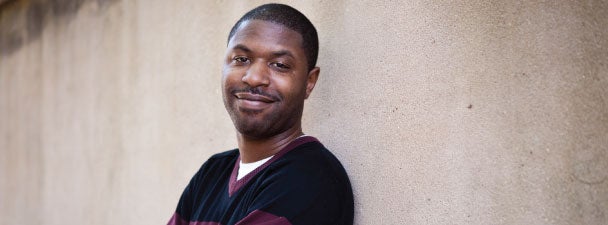 When he first came to the College, it was as a panhandler. Tony Ellis was just a kid from the Eastside, looking for a buck. Looking for a little escape, maybe. Some time out from under the shadows of Charleston’s old Cooper River bridges. Out from under the shadows of his neighborhood, his community. His speech impediment.
When he first came to the College, it was as a panhandler. Tony Ellis was just a kid from the Eastside, looking for a buck. Looking for a little escape, maybe. Some time out from under the shadows of Charleston’s old Cooper River bridges. Out from under the shadows of his neighborhood, his community. His speech impediment.
They called him “Stutter Butter.” They taunted, they teased, they mimicked. And not just the students – the teachers, the school administrators. They put him in special education classes. He was bullied. He fought back. He was suspended. His self-esteem plummeted. He considered suicide. He needed out.
Again, he turned to the College. He was looking for something different.
“My goal was to drop out of school and work at the College’s cafeteria,” Ellis recalls. “My idea was that a dishwashing job would not require any verbal communication, and dropping out of school would relieve me of constant embarrassment.”
Between the eighth and 11th grades, he applied for dishwashing jobs at the College at least 25 times. Fortunately, he never landed so much as an interview.
“If I were interviewed and hired, I would have dropped out of school to work at the College full time,” says Ellis. “But I stayed in school because I never got called in for an interview.”
Actually, Ellis did eventually get an interview – 15 years later, and this time not as a dishwasher, but as an adjunct member of the teacher education faculty.
“Never in my life would I have imagined teaching here. It is extremely emotional for me because of my ties to Charleston,” says Ellis, who – thanks in large part to his high school band director – not only became the first male in his family to complete high school, but went on to earn his B.A. in religion and philosophy from Benedict College, his M.A. in religious studies from Howard University and both his M.Ed. and Ed.D. in educational leadership and policy studies from Howard University. “Many people doubted that a speech-impaired person could successfully defend a doctoral dissertation. Honestly, I had my doubts as well. But I debunked the myth that students who receive special education–related schooling cannot succeed academically.”
Ellis considers his hire a groundbreaking one on the part of the Department of Teacher Education – especially considering that, out of the 50 public K–12 schools he surveyed in Maryland, Virginia and Washington, D.C., not one of them employed a speech-impaired teacher. And, out of the 200 schools of education at the university level that he surveyed, only six had speech-impaired faculty members.
“I strongly believe that students who want to be teachers need to be exposed to faculty members who have outward disabilities, especially students who desire to become special education teachers. In my opinion, one of the best ways to prepare teachers to work with K–12 students with disabilities is to allow them to learn from a professor with an outward disability,” he says, adding that, because of his speech impediment, he proves to his students that there are many ways to teach effectively, that traditional lecturing isn’t the only way. “My students now have what it takes to authentically tell their future students, ‘You can be anything you want to be, despite your physical challenges or disability.’”
It’s a message that Ellis wishes he’d heard as a kid. Maybe it would have kept him out of trouble. Maybe it would have kept him away from special-education classes, away from the fights, away from detention.
Maybe so. But it certainly wouldn’t have kept him away from the College of Charleston.




